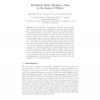Free Online Productivity Tools
i2Speak
i2Symbol
i2OCR
iTex2Img
iWeb2Print
iWeb2Shot
i2Type
iPdf2Split
iPdf2Merge
i2Bopomofo
i2Arabic
i2Style
i2Image
i2PDF
iLatex2Rtf
Sci2ools
141
click to vote
ECOOP
2007
Springer
2007
Springer
Morphing: Safely Shaping a Class in the Image of Others
We present MJ: a language for specifying general classes whose members are produced by iterating over members of other classes. We call this technique “class morphing” or just “morphing”. Morphing extends the notion of genericity so that not only types of methods and fields, but also the structure of a class can vary according to type variables. This offers the ability to express common programming patterns in a highly generic way that is otherwise not supported by conventional techniques. For instance, morphing lets us write generic proxies (i.e., classes that can be parameterized with another class and export the same public methods as that class); default implementations (e.g., a generic do-nothing type, configurable for any interface); semantic extensions (e.g., specialized behavior for methods that declare a certain annotation); and more. MJ’s hallmark feature is that, despite its emphasis on generality, it allows modular type checking: an MJ class can be checked inde...
Related Content
| Added | 07 Jun 2010 |
| Updated | 07 Jun 2010 |
| Type | Conference |
| Year | 2007 |
| Where | ECOOP |
| Authors | Shan Shan Huang, David Zook, Yannis Smaragdakis |
Comments (0)

